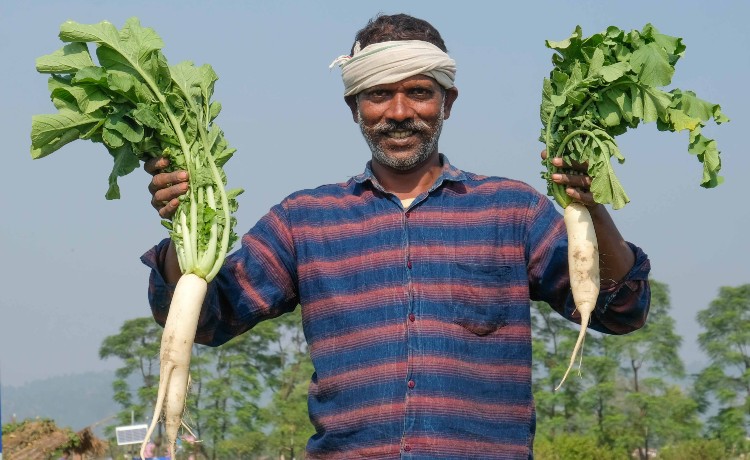Indian farmers face
significant challenges in agriculture - fragmentation of land ownership,
increased cost of cultivation, deteriorating soil health, uncertain market
spaces. In addition to this, climate change is a major threat. It seems there is no end to the hurdles that
the humble Indian farmer must jump over.
To counter these odds,
organic farming is emerging as a reliable solution – so much so, that in 2019, Uttarakhand
became the first state in India to introduce an Organic Agriculture Act. Whilst
the state of Sikkim had already achieved the rank of the country's first
organic state, Uttarakhand has been hot on its heels in pursuit of a similar
status with the Organic Agriculture Act being an official step toward turning
the state fully organic.
ACF has been two steps ahead of this movement, having kickstarted organic farming promotion in 2010 in Bhagwanpur block in Uttarakhand - reaching out to 50 farmers from 6 villages with 20 hectares of land. With over 10 years’ experience in promoting organic farming, ACF has seen, first hand, the tangible benefits that organic farming can bring to farmers and their families. The aims of the program were to promote the availability of safe and healthy foods to farmers, reduce the negative impact on the environment and reduce farmer cultivation costs to enhance the profitability of farming.

And the program has taken
off! Today, the district is home to the Bhu
Amrit Farmer Producer Organisation (formed in 2018), a collective of organic
farmers who work across the entire value chain of organic production,
certification, and marketing. With 667
farmer shareholders, the group produces a variety of products and has commenced
marketing them in key markets such as Delhi, Gujarat & Punjab, and has even
moved their products online, via Flipkart and Amazon. This highlights the success of the program
and its growth over the years as a direct result.
With the learnings and success
from its organic farming project in Bhagwanpur block, ACF is now scaling the
project in other blocks of Haridwar district, with the support of HDFC Bank
Ltd's social initiative ‘Parivartan’ – aiming to reach 10,000 farmers within
three years.
In order to promote
organic farming and get the buy-in of farmers, ACF takes a systematic approach
to the entire value chain of organic farming – beginning with land preparation,
sowing, providing alternatives for chemical input, organic certification, post-harvest
value addition, processing, branding, and marketing.
And farmer education,
capacity building and handholding is a crucial part of the process -instrumental
in building confidence among farmers, who once struggled to make agriculture
profitable and sustainable. ACF imparts the following practices to promote
organic and natural sustainable farming:
· Training to farmers on pre-sowing, post-sowing and management of pest attack.
·
Operating demonstration plots to display organic and natural
farming practices to farmers.
·
Soil Improvement via preparation of decomposer, mulching, green
manuring and support to farmers in Agri inputs.
·
Pest Management via support to farmers in agri inputs, sticky
traps and preparation of Jeeva Amrit.
·
Organising exposure visits for farmers for better adoption of
Organic practices.
·
Providing access to Certification and Training on Organic
practices.
From 50 farmers in 2010 to 7662 farmers today, the program is now covering 6970 Ha cultivable land across 36 villages of Roorkee.

Farmers like Meena Devi from Daurbasi Village in Haridwar takes care of a six member family with a 5 acre parcel of land. Previously, she would extensively use
harsh chemicals on her crops -resulting in increased cost, poor quality produce
and decreased quantity of crops. Reaching out to ACF, she received technical
know how on Organic Farming and initially started practicing it on just 1 acre
land to assess results. Today she practices organic farming in an integrated
manner across all 5 acres, and is acting as a change agent - motivating other
farmers to practice organic farming.
Growing paddy, sugarcane, wheat, flax
seeds, mustard and pulses by using bio-fertilizers for better yield, she says,
“I feel good when I eat tasty, nutritious food free of chemicals, and it gives
me a thrill when I can feed others as well.’’
Her profits have increase manifold and she looks forward to seeing what
else she can achieve via organic farming.
And whilst farmer profitability
increases, according to the International Federation of Organic Agriculture
Movements, organic farming also contributes to almost half of the 17 UN
Sustainable Development Goals (SDGs) – helping India achieve its SDG targets in
the following areas:
·
Zero Hunger (SDG 2),
·
Good Health & Wellbeing (SDG 3),
·
Clean Water & Sanitation (SDG 6),
·
Decent Work and Economic Growth (SDG 8),
·
Responsible Consumption & Production (SDG 12),
·
Climate Action (SDG 13),
·
Life Below Water (SDG 14)
·
Life on Land (SDG 15).
Whilst it’s still early days, organic
farming in Uttarakhand is gaining traction – and ACF farmers are getting
onboard, with 192 farmers certified and 198 farmers who are in the process of
certification. We look forward to see
where farmers take this in the future, and to more stories of prosperity from
the ground in Uttarakhand.







0 Comment